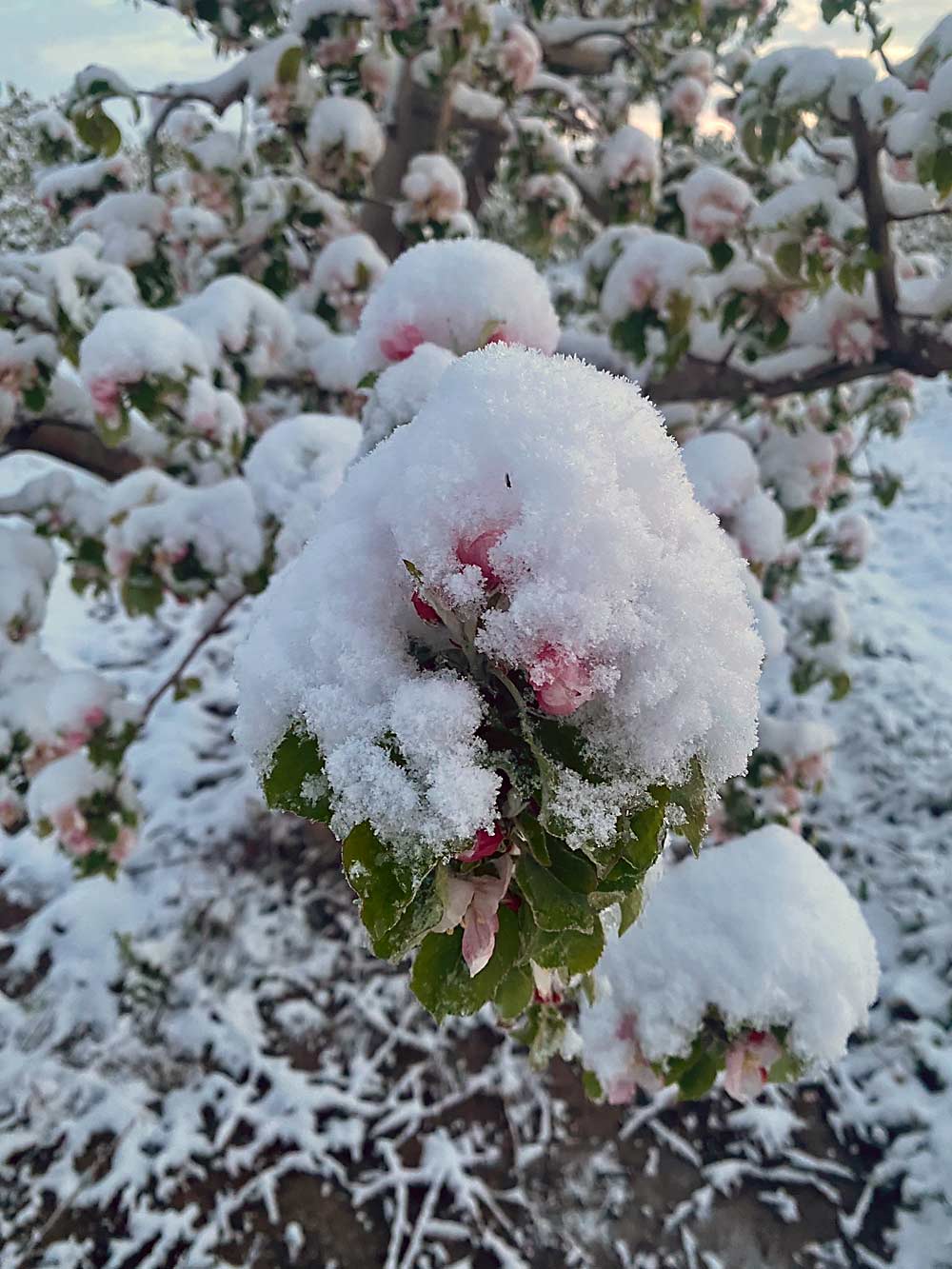
Freeze events between April 20 and 22 hit some Great Lakes fruit regions hard, threatening buds during a vulnerable phase. It’s still too early to know the full extent of the damage, but it was significant in some areas, while other areas were relatively untouched.
Michigan
In greater Grand Rapids, where most of Michigan’s apples grow, temperatures dropped as low as 23 degrees Fahrenheit on April 21. Considerable damage was observed in apple flower bud evaluations across the region, but the extent depended greatly on variety and location. More sensitive varieties such as Red Delicious suffered the worst injury, with nearly 100 percent mortality of king blossoms, though healthy laterals were present in most flower clusters. Damage was much less severe in other varieties. In most places there appeared to be plenty of healthy lateral blossoms present to support a full crop, said Anna Wallis, an apple production specialist with Michigan State University.
Stone fruits suffered some damage as well. It was by no means a complete loss, but some varieties on some sites were hurt while others were OK, said MSU tree fruit educator Amy Irish-Brown.
In Southwest Michigan, cold weather caused an extended bloom in tart cherries, plums and peaches, making successful pollination less likely when the weather turns warm. Inner flower parts were not brown, so it was not immediately obvious if they were still viable. There was a lot of bloom in stone fruits because of light crops last year, which gives growers a bit of a buffer, said MSU tree fruit educator Bill Shane.
Apples were in pink, so they were probably better off from a flower-vitality standpoint. Earlier-blooming apples such as Red Delicious and Idared had more king bloom damage, but the other bloom was generally in good shape. They expect more damage in lower sites, Shane said.
Blueberries seemed to have a little damage to the earliest blooms in some susceptible sites, but they largely made it through unscathed. There were scattered reports of grape damage, but nothing consistent or significant. At the moment, growers expected crop volumes to be unaffected, said MSU extension educator Michael Reinke.
In Northwest Michigan, some damage was observed in tart cherries and sweet cherries, but very little in apples. The full impact of the freezing temperatures will not be known for some time, said MSU fruit educator Nikki Rothwell.
Indiana
Many parts of Indiana saw temperatures of 26 to 29 degrees Fahrenheit April 20–21, which caused some damage to open flowers. More northern areas of the state were not very far along in terms of crop development (early pink in apples, early bloom in peaches), so the damage was limited. Purdue University’s Meigs Horticulture Research Farm in Lafayette hit a low of 21.9 degrees Fahrenheit, and damage to apples there was extensive, said Purdue horticulture professor Peter Hirst.
At Beasley’s Orchard, about 30 miles west of Indianapolis, owner Calvin Beasley estimated a fruit loss of about 90 percent.
“Some of the less mature buds on the trees are looking healthy and are opening now,” he said. “It remains to be seen if these will set fruit and what quality that fruit will be, but we are thankful to be seeing some life.”
In north central Indiana, grower David Doud said his pears were gone and his peaches were looking bad. Most of his apple varieties had one to three side blooms per cluster still alive, so there was some kind of crop potential.
New York
Damage looked minimal in Western New York. Temperatures fell as low as 28 degrees Fahrenheit when some stone fruits were in bloom and apples were mostly tight cluster to early/first pink, said Cornell Cooperative Extension specialist Craig Kahlke.
CCE specialist Mario Miranda Sazo noticed a few kings missing, but nothing significant.
In the Champlain Valley, CCE specialist Michael Basedow found very minor damage in a couple of Honeycrisp blocks. Trees were still between half-inch and tight cluster when temperatures hit 25 degrees Fahrenheit in a few spots, but he thinks growers avoided major damage.
—by Matt Milkovich






Leave A Comment